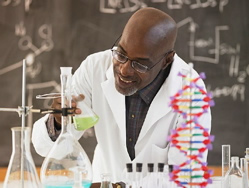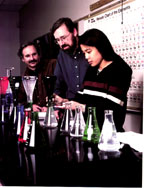
Welcome to SED 695B
 Introduction
Introduction
- Agenda
- Moodle
- Assessment
- Previous Cohort | Students | Work
- Teacher's Guide Format
Schedule
 Demonstration
equipment (focus on physics, physical sciences)
Demonstration
equipment (focus on physics, physical sciences)- Longitudinal research (focus on biology)
- Fieldwork (focus on geology, geoscience, environmental science)
- Discrepant events (biology, chemistry, physics, geoscience)
- Experiment kits (focus on chemistry)
- Microscopy (focus on biology)
- Instrumentation (biology, chemistry, physics, geoscience)
- *AP labs (biology, chemistry, physics, geoscience)
Books
 Herr, Norman (2008). The Sourcebook for Teaching Science – Strategies, Activities, and Instructional Resources. San Francisco. John Wiley / Jossey Bass. 584 pages.
Herr, Norman (2008). The Sourcebook for Teaching Science – Strategies, Activities, and Instructional Resources. San Francisco. John Wiley / Jossey Bass. 584 pages. - Herr, N. and J. Cunningham (1999). Hands-On Chemistry Activities with Real-Life Applications. West Nyack, New York, The Center for Applied Research in Education (Prentice-Hall). 638 pages.
- Cunningham, J. and N. Herr (1994). Hands-On Physics Activities with Real-Life Applications. West Nyack, New York, The Center for Applied Research in Education (Simon & Schuster), 670 pages.
Michael D. Eisner College of Education
 The faculty of the Michael D. Eisner College of Education, regionally focused and nationally recognized, is committed to Excellence throughInnovation. We believe excellence includes the acquisition of professional knowledge, skills, and dispositions and is demonstrated by the growth and renewal of ethical and caring professionals - faculty, staff, candidates - and those they serve. Innovation occurs through collaborative partnerships among communities of diverse learners who engage in creative and reflective thinking. To this end we continually strive to achieve the following competencies and values that form the foundation of the Conceptual Framework.
The faculty of the Michael D. Eisner College of Education, regionally focused and nationally recognized, is committed to Excellence throughInnovation. We believe excellence includes the acquisition of professional knowledge, skills, and dispositions and is demonstrated by the growth and renewal of ethical and caring professionals - faculty, staff, candidates - and those they serve. Innovation occurs through collaborative partnerships among communities of diverse learners who engage in creative and reflective thinking. To this end we continually strive to achieve the following competencies and values that form the foundation of the Conceptual Framework.
